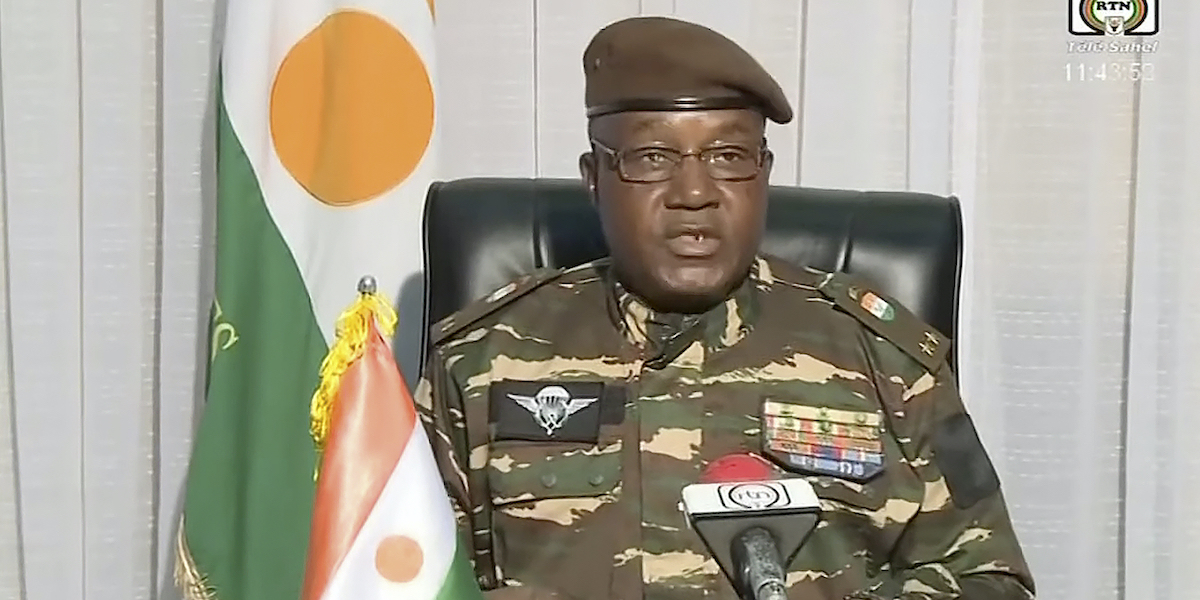On Friday Abdourahmane Tchiani, the head of Niger’s presidential guard also known as Omar Tchiani, proclaimed himself the country’s new leader after the coup that deposed Mohamed Bazoum, the democratically elected incumbent president in 2021, two days earlier. Tchiani and nine men of the Presidential Guard, gathered in a delegation that gave itself the name of “Conseil National pour la sauvegarde de la patrie” (National Council for the protection of the country), claimed responsibility for the coup with a speech delivered in broadcast live on RTA (Radio Télévision Niger), the public broadcasting organization of Niger.
Among other things, Tchiani justified his self-proclamation on the basis of the need to “intervene” to remedy a series of security, economic and corruption problems. Tchiani also announced the suspension of institutions, the closure of land and air borders and the imposition of a curfew.
Few details of Tchiani’s biography are known. Ibrahim Yahaya Ibrahim, a researcher of the think tank International Crisis Group, said Tchiani “is not well known outside military circles. He is a man in the background, powerful, but not a figure of great consensus ». As reported by some newspapers international, Tchiani is 62 years old and was born between 1960 and 1961 in Filingue, a small urban center in the Tillabérim region, in the southwestern part of Niger. He is part of the Hausa, an ethnic group of Sunni Islamic religion settled in the African region of the Sahel.
Radio France Internationale wrote that he was trained in a military academy in Thiès, Senegal. In 1989 he was awarded an honor as the first officer to arrive at the scene after the crash of a plane of the French company UTA in the Ténéré desert, a crash that caused the death of 170 people.
Tchiani became head of the Presidential Guard in 2011, in an appointment decided by the then President of Niger, Mahamadou Issoufou (2011-2021). Before that moment, Tchiani had performed various functions: among other things, he had been military attaché at the Niger embassy in Germany and had worked as head of some missions on behalf of the UN (such as the one in collaboration with the in Darfur, which ended in 2020) and the Economic Community of West African States (ECOWAS). Tchiani had also conducted some military operations in the Niger desert against smuggling and drug traffickers.
Tchiani is described as a loyalist of Issoufou: during his two mandates, the president held the Presidential Guard in high esteem, allowing it to acquire considerable influence, also with a view to using it to avert possible coups.
The link with Issoufou, in addition to guaranteeing him stability and power, allowed Tchiani to accumulate considerable personal wealth. Second The worldduring his ten years at the helm of the Presidential Guard, the general invested heavily in real estate and took possession of large herds of cattle, creating a large ranch on the outskirts of Filingué.
After his election, Bazoum, the president deposed in the latest coup, reappointed Tchiani as head of the Presidential Guard. Relations between the two, however, began to crack after a few months. As explained in an interview with the news agency AFP by Abdourahmane Idrissa, a Nigerien researcher at the Center for African Studies in Leiden (The Netherlands), the general feeling was that Bazoum was unable to completely free himself from Issoufou’s legacy, to the point that many in Niger spoke of a “presidency two heads”.
To distance himself from his predecessor, Bazoum tried adopting a different style of presidency: for example, he reduced the number of bodyguards on foreign trips and began speaking more often to the press. He also tried to curtail the power of Tchiani and the Presidential Guard. In the months preceding the coup, inaccurate information had also circulated about the relationship between Bazoum and Tchiani: for example, according to as reported by the African News Agency WHAT newsa false decree, signed by Bazoum, had been published on social media ordering the dismissal of Tchiani and his replacement at the head of the Presidential Guard with another general, Mohamed Toumba.
At the moment Tchiani does not seem to have succeeded in obtaining the support of the national army. It had already happened in the past that members of the Presidential Guard took power through coups: in 1996 Ibrahim Baré Mainassara did it, and three years later it was the turn of Daouda Malam Wanké.
